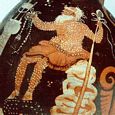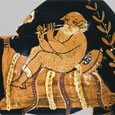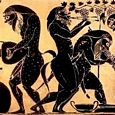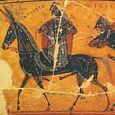SEILENOI
Greek Name
Σειληνος Σειληνοι
Transliteration
Seilênos, Seilênoi
Latin Spelling
Silenus, Sileni
Translation
Silen, Silens
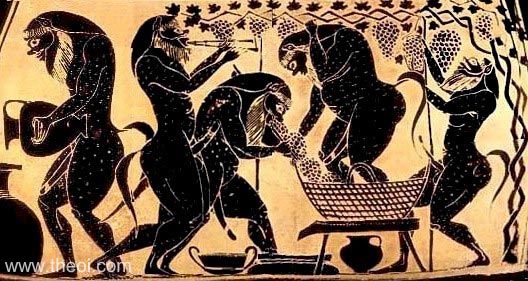
THE SEILENOI (Silens) were elderly, rustic spirits (daimones) in the train of the god Dionysos. They were sons of the elder Seilenos (Silenus) and the fathers of the tribes of Satyrs and Oreiades (mountain nymphs).
Seilenoi were depicted as fat, elderly, white-haired men, with snub noses, balding heads, and the ears and tails of asses. They were sometimes covered in fluffy white hair and occasionally sported a pair of ox horns.
The name Seilenos is derived from the words seiô, "to move to and fro," and lênos, "the wine-trough."
The twelve male guardians of the infant Dionysos known as Pheres Lamioi (Lamian Beasts) were probably Seilenoi.
FAMILY OF THE SILENS
PARENTS
SEILENOS (Propertius 2.32, Nonnus Dionysiaca 14.96)
NAMES
MARON, LENEUS, ASTRAIOS (Nonnus Dionysiaca 14.96)
OFFSPRING
THE SATYROI (Nonnus Dionysiaca 14.96)
ALTERNATE NAME SPELLINGS
Greek Name
Σιληνος Σιληνοι
Transliteration
Silênos, Silênoi
Latin Spelling
Silenus, Sileni
Translation
Silen, Silens
CLASSICAL LITERATURE QUOTES
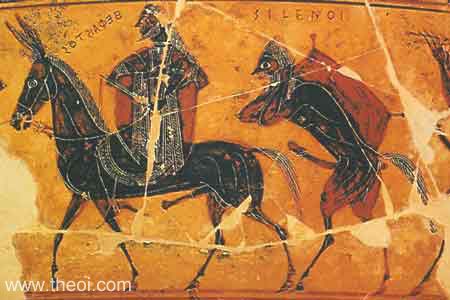
Homeric Hymn IV to Hermes 256 ff (trans. Evelyn-White) (Greek epic C7th to 4th B.C.)
:
"The deep-breasted Mountain Nymphai (Nymphs) [i.e. Oreiades] who inhabit this great and holy mountain . . .
with them the Seilenoi (Silens) and the sharp-eyed Argeiphontes [Hermes] mate in the depths of pleasant caves
[presumably fathering Satyroi (Satyrs)]."
Antipator of Sidon, Epigram (trans. Page, Vol. Select Papyri III, No. 107 (4))
(Greek elegiac C1st B.C.) :
"To the Silenoi's (Silens') mates that dwell in caves [i.e. the Nymphai (Nymphs)], and to their chieftain,
horned Pan Akrorites (Acrorites) (of Mount Akroria)."
Strabo, Geography 10. 3. 7 (trans. Jones) (Greek geographer C1st B.C. to C1st A.D.)
:
"Like the accounts of the Satyroi (Satyrs), Silenoi (Silens), Bakkhai (Bacchae), and Tityroi (Tityri); for
the Kouretes (Curetes) ... are called Daimones or ministers of gods."
Strabo, Geography 10. 3. 10 :
"The [daimones called] Silenoi (Silens) and Satyroi (Satyrs) and Bakkhai (Bacchae), and also the Lenai
(Lenae) and Thyiai (Thyiae) and Mimallones and Naïdes Nymphai (Naiad Nymphs) and the beings called Tityroi,
[are followers] of Dionysos."
Pausanias, Description of Greece 1. 23. 6 (trans. Jones) (Greek travelogue C2nd A.D.)
:
"The oldest of the Satyroi (Satyrs) are called Silenoi (Silens)."
Pausanias, Description of Greece 6. 24. 8 :
"That the Silenoi (Silens) are a mortal race you may infer especially from their graves, for there is a
tomb of a Silenos (Silen) in the land of the Hebrews, and of another at Peramos."
Aelian, Historical Miscellany 3. 40 (trans. Wilson) (Greek rhetorician C2nd to 3rd
A.D.) :
"Note that Dionysos' companions in the dance were Satyroi (Satyrs), called by some Tityroi (Tityri). They
received this name from the trills (teretismata) which the Satyroi enjoy, and the Saytroi got their
name from the word ‘to grimace’ (sesêrenô), the Silenoi (Silens) from the word
‘to mock’ (sillainô)--they say that silos is criticism with disagreeable humour. The
Silenoi wore cloaks with wool on both sides. Their dress recalls Dionysos' vegetation, the thick foliage of the
vines and the vine twigs." [N.B. These etymologies are late classical inventions.]
Philostratus the Elder, Imagines 1. 25 (trans. Fairbanks) (Greek rhetorician C3rd
A.D.) :
"[From a description of an ancient Greek painting :] By act of Dionysos the earth of the Andrians is so
charged with wine that it bursts forth and send up for them a river . . .
The River-[god] lies on a couch of grape-clusters, pouring out its stream, a river undiluted and of agitated
appearance; thyrsoi grow about it like reeds about bodies of water . . . Dionysos also sails to the revels of
Andros and, his ship now moored in the harbour, he leads a mixed throng of Satyroi (Satyrs) and Lenai and all
the Seilenoi (Silens)."
Pseudo-Hyginus, Astronomica 2. 23 (trans. Grant) (Roman mythographer C2nd A.D.)
:
"According to Eratosthenes [Greek writer C3rd B.C.], another story is told about the Asses. After Jupiter
[Zeus] had declared war on the Gigantes (Giants), he summoned all the gods to combat them, and Father Liber
[Dionysos], Vulcanus [Hephaistos (Hephaestus)], the Satyri (Satyrs), and the Sileni (Silens) came riding on
asses. Since they were not far from the enemy, the asses were terrified, and individually let out a braying such
as the Gigantes had never heard. At the noise the enemy took hastily to flight, and thus were defeated."
Propertius, Elegies 2. 32 (trans. Goold) (Roman elegy C1st B.C.) :
"She [Aphrodite] loved a shepherd [Ankhises (Anchises)] and amid his flocks gave herself, a goddess, to
him; their armour was witnessed by the band of sister Hamadryades as well as the Sileni (Silens) and the father
of the company himself [Silenos (Silenus)], with whom were Naiads gathering apples in the vales of Ida."
Nonnus, Dionysiaca 11. 351 ff (trans. Rouse) (Greek epic C5th A.D.) :
"[In the company of Dionysos :] The horned shape of a shaggy Seilenos (Silenus), holding a thyrsos, with a
dappled skin draped upon him, as he supported his frame on a fennel stalk, for a staff the old man's
friend."
Nonnus, Dionysiaca 13. 43 ff :
"[Rustic spirits join the army of Dionysos for his campaign against the Indians :] The heroic breed of
farscatterd champions, the hairy Satyroi (Satyrs), the blood of the Kentauroi (Centaurs) tribe, the bushyknee
ancient [Seilenos (Silenus)] and his phalanx of Seilenoi (Silens), the regiment of Bassarids."
Nonnus, Dionysiaca 14. 96 ff :
"[Rheia summons the rustic divinities join the army of Dionysos for his war against the Indians :] Old
Seilenos (Silenus) also was ready for the fray, holding the fennel-stalk, that horned son of the soil with
twiform shape. He brought three festive sons [the Seilenoi (Silens)]: Astraios (Astraeus) was armed for battle;
Maron came too, and Leneus followed, each with a staff to support the hands of their old father in his travels
over the hills. These ancients already weak and vinebranches to support their slow bodies: many were the years
of their time, from these had sprung the twiform generation of the muchmarried Satyroi (Satyrs)."
Nonnus, Dionysiaca 23. 151 ff :
"[The army of Dionysos fords the river Hydaspes in India :] Pan crossed the surface of the calm river on
his goat's feet . . . The old Seilenoi (Silens) went voyaging on the deep paddling Hydaspes with foot and
hand."
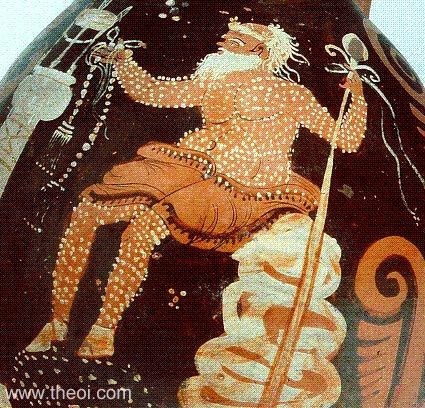
Nonnus, Dionysiaca 24. 218 ff :
"[During the Indian War :] In the forest Bakkhos (Bacchus) held a feast with his Satyroi (Satyrs) and
Indian-slaying warriors: bulls were slaughtered, rows of heifers were struck with axes and cut up with knives,
whole flocks of sheep were killed from the captured Erythraian herds. Seilenoi (Silens) and Satyroi settled in
companies round the table with the god of the thyrsus, all with multitudinous hands partook of the same food.
Infinite wine was drunk by all in order; the servers emptied endless fragrant jars as they drew the nectarean
juice of the perfect grape."
Nonnus, Dionysiaca 27. 221 ff :
"[Dionysos rallies his troop for a battle with the Indians :] With this speech he gave them courage. The
Bakkhante (Bacchante) women made haste, the Seilenoi (Silens) shouted the tune of the battle-hymn, the Satyroi
(Satyrs) opened their throats and shouted in accord; the sound of the beating drum rang out, beating time with
its terrifying boom, the rattling women clanged their double strokes with alternate hands; the shepherd's syrinx
piped out its Phrygian notes to summon the host.
In front of the army, pushing to the fray, the Mygdonian torch shone leaping through the air, proclaiming the
fiery birth of Bakkhos (Bacchus). The horned brow of old Seilenos (Silenus) sparkled with light; snakes were
twined in the unplaited hair of the hillranging Bakkhante women. The Satyroi also fought; they were whitened
with mystic chalk, and on their cheeks hung the terrifying false mask of a sham voiceless face. One lashing a
maddened tiger against his foes scattered the cars of linked elephants. Hoary Maron [one of the Seilenoi] was
armed with a clustering shoot, and pierced the bodies of fighting Indians with a branch of garden-vine."
Nonnus, Dionysiaca 29. 243 ff :
"[During the battles of the Indian War :] Trygie [an old Bakkhante] with limping knee was left behind the
company last of all, her feet frozen with fear. Not one of the Seilenoi (Silens) kept beside her; but they left
her there alone frightened, without a helper. She held out her hands to [the Seilenos (Silen)] Maron the hard
drinker, but Maron would have nothing to do with the old woman because she only hindered the dances of
winegreedy Korybantes (Corybantes) and Satyroi (Satyrs): he did nothing but pray to the gods to let the silly
old hag fall before the spear of Deriades [the Indian King] . . .
Morrheus drove off a company of Seilenoi, beating them with his poleace: at one shout of the driver Astraios was
shaken, Maron fled, Leneus collapsed, the three sons of shaggyhaired Seilenos (Silenus), who himself sprang up
out of mother earth unbegotten and self-delivered."
Nonnus, Dionysiaca 34. 128 ff :
"[Dionysos is driven mad by Hera and abandons his army in India leaving them demoralized :] The Seilenoi
(Silens) went to battle in sober silence with their wits about them; they had not painted their faces with
crimson like fresh blood, nor purpled their yellow skin to deceive and affright, nor daubed their foreheads with
white chalk as usual."
Nonnus, Dionysiaca 36. 140 ff :
"[The Indian King Deriades rallies his troops :] ‘This day either I shall drag Dionysos by the hair,
or his assault shall destroy the Indian nation! You, fall on the Satyroi (Satyrs) and check them by main force:
let Deriades confront Dionysos . . . as for the oxhorned Seilenoi (Silens) and the crowds of Satyroi (Satyrs),
shear off like a crop all their heads with devastating steel, and hang the oxhorned skulls in strings round all
our hourses.’"
Nonnus, Dionysiaca 36. 433 ff :
"[The Indian general Morrheus rallies his troops :] ‘You know also what I have done in resisting
Dionysos, fighting Satyroi (Satyrs), and cutting off the hateful heads of that oxhorned generation [Seilenoi
(Silens)] with shearing steel.’"
Nonnus, Dionysiaca 36. 450 ff :
"[The Indian Morrheus rallies his troops :] ‘When will highhorn Pan, the crazy ranger of the hills,
tear Indian ships to pieces with sharp claws? No Seilenos (Silen) can row over the loudrumbling waters, and sink
a ship of war with a peaceful ferule, leaping to bloody dance with freanzied foot, striking up a chant with
death in it; in the sea he will never transfix a man with his bullhorns, and get near enough to cut him in tow
at the waist and vanquish him. No! one blow shall send him headlong, and he shall lie in the billows where he
will find no tomb.’"
Nonnus, Dionysiaca 43. 307 ff :
"[Poseidon leads the sea-gods in battle against Dionysos during the Indian War :] Seilenoi (Silens)
spluttering drops of Kilikian (Cilician) wine-dew equipt themselves as riders of Mygdonian lions, and danced
with a din against the crowd from the sea, brandishing in their hands their viny warpole, as they stretched
their hands over the lion's necks and plucked at the mane and boldly checked their furious mounts by this
bristly bridle. A Seilenos (Silen) tore off a roof from a rocky hole and attacked Palaimon (Palaemon), and drove
Ino wandering through the water with his ivy spear. One fought with another . . . Hosts of Seilenoi rushed
along, and one of them with his two legs straddling across the back of a bull squeezed out a tune on his two
pipes tied together."
Nonnus, Dionysiaca 45. 318 ff :
"[The companions of Dionysos at play :] One old Seilenos (Silen) dragged a boar by the snout and threw the
tusked swine up on the air for fun. Another with stormy leaps of his feet in a moment mounted upon a camel's
neck; and one jumped on a bull and rode on his back."
Nonnus, Dionyiaca 48. 188 ff :
"[At the wedding of Dionysos and Pallene of Thrake (Thrace) :] That was a wedding of many songs: the
bridechamber was never silent, Seilenoi (Silens) chanted, Bakkhantes (Bacchantes) danced, drunken Satyroi
(Satyrs) wove a hymn of love and sang the alliance which came of this victorious match."
Suidas s.v. Bakkhai (trans. Suda On Line) (Byzantine Greek lexicon C10th A.D.)
:
"Bakkhai (Bacchantes) : [Bakkhai] and Satyroi (Satyrs) and Panes and Silenoi (Silens), attendants of
Dionysos."
ANCIENT GREEK ART
SOURCES
GREEK
- The Homeric Hymns - Greek Epic C8th - 4th B.C.
- Greek Papyri III Antipater of Sidon, Epigrams Fragments - Greek Elegiac C1st B.C.
- Strabo, Geography - Greek Geography C1st B.C. - C1st A.D.
- Pausanias, Description of Greece - Greek Travelogue C2nd A.D.
- Aelian, Historical Miscellany - Greek Rhetoric C2nd - 3rd A.D.
- Philostratus the Elder, Imagines - Greek Rhetoric C3rd A.D.
- Nonnus, Dionysiaca - Greek Epic C5th A.D.
ROMAN
- Hyginus, Fabulae - Latin Mythography C2nd A.D.
- Propertius, Elegies - Latin Elegy C1st B.C.
BYZANTINE
- Suidas, The Suda - Byzantine Greek Lexicon C10th A.D.
BIBLIOGRAPHY
A complete bibliography of the translations quoted on this page.
